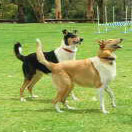Breed: Rough and Smooth Collies
Temperament: active and friendly
Lifespan: 12-14 years
Maintenance: medium
Recommended for: families
Breed: Smooth and Rough Collie
History
When most people think of the Collie dog, the famous Lassie is the first thing that springs to mind. Lassie was in fact a long-haired, Rough Collie. There are actually two different varieties of the very same breed. The other is short-haired and called a Smooth Collie.
The Collie takes its name from the black-faced sheep of Scotland that were known as ‘colleys’. The collie was a shepherd’s dog, which became further refined after attracting the attention of nobility and becoming more popular.
Appearance
There are two types of Collie, defined by their coats: rough and smooth. the only difference is the length of the coat. The rough variety has a dense, straight, coarse outer coat and a soft, furry undercoat. The smooth variety is without the coarse outer coat. The Rough Collie should have an abundant mane and frill and profuse hair on the tail. The breed is commonly incorrectly called Collie Rough and Collie Smooth. This is simply how the breed is written in the breed standard. I.e. ‘Collie, Rough’ and ‘Collie, Smooth’. When actually talking about the breed it should be called ‘Smooth’ or ‘Rough Collie’.
The breed stands between 51-61cm (20-24in) and weighs between 18-29.5kg (40-65lb). There are three main colours: sable and white, tri-colour (predominantly black and white with tan markings about the head and legs) and blue merle (clear silvery blue splashed with marbled black and tan markings).
The merle gene is a dominant, colour dilution gene and is responsible for defects and deaths if paired with another merle gene. Breeding merle to merle will have a lethal result for one quarter of the litter. Breeding merle to full colour will produce half merle and half full-coloured litters. Under no circumstances should merle dogs be bred with each other.
Temperament
Breeders say it is a gentle-natured dog and loyal towards its family. There is evidence of Collies being responsible for a very few attacks on humans. The statistics are there, but realistically quite low. Collies are loyal and protective of their families, especially towards child members of its family. Only buy from reputable breeders. The breed is renowned for its intelligence though is yet to lose its herding instincts. Collies respond to firm but gentle training and discipline, but may become stubborn if subjected to harsh treatment. The breed is agile and easy to train.
Health and lifespan
This breed is prone to a hereditary eye problem called Collie Eye Anomaly that can cause blindness in one or both eyes. Breeding stock should be clear of the condition, which can be detected at an early age. When buying a puppy make sure you view a certificate stating the animal is free of the condition. The long narrow muzzle, if lacking in pigment, is also prone to sunburn. Fair skin dogs may require sun block on these areas. Dogs with black noses experience no problems. Finally, not all heartworm medications are safe for Collies. Check with your local veterinarian which medication to use. Expected lifespan of 12-14 years.
Maintenance
Both rough and smooth collies shed hair frequently and need regular grooming; about 20 minutes three times a week for the rough variety and a weekly 15 minute brush for the smooth. When they are dropping their coat, more grooming is required. Breeders say the double coat is an insulator and clipping is not required during the hotter months.
The Rough Collie requires additional attention, including checking its coat for burrs and seeds and making sure hair behind the ears and between the legs does not become knotty. Brushing should be carried out with a pin brush, which reaches through the Collie’s undercoat. The dog’s ears should be regularly checked and cleaned.
National contacts
To find up-to-date contacts for breeders, contact the following organisations.
Dogs NSW
http://www.dogsnsw.org.au/breeders-directory
Email: [email protected]
Phone: 1300 728 022 (NSW only) or (02) 9834 3022
Fax: (02) 9834 3872
Dogs Victoria
http://www.vca.org.au
Email: [email protected]
Phone: (03) 9788 2500
Fax: (03) 9788 2599
Dogs ACT
http://www.actca.asn.au
Email: [email protected]
Phone: (02) 6241 4404 – Fax: (02) 6241 1129.
Dogs West
http://www.cawa.asn.au
Email: [email protected]
Phone: (08) 9455 1188
Fax: (08) 9455 1190
Dogs SA
http://dogssa.com.au
Phone: (08) 8349 4797
Canine Control Council of Queensland
http://www.cccq.org.au
Email: [email protected]
Phone: (07) 3252 2661
Fax: (07) 3252 3864
Tasmanian Canine Association
http://www.tasdogs.com
Email: [email protected]
Phone: (03) 6272 9443
Fax: (03) 6273 0844
Dogs NT
http://www.territorydogworld.com
Email: [email protected]
Phone: (08) 8984 3570
Fax: (08) 8984 3409



